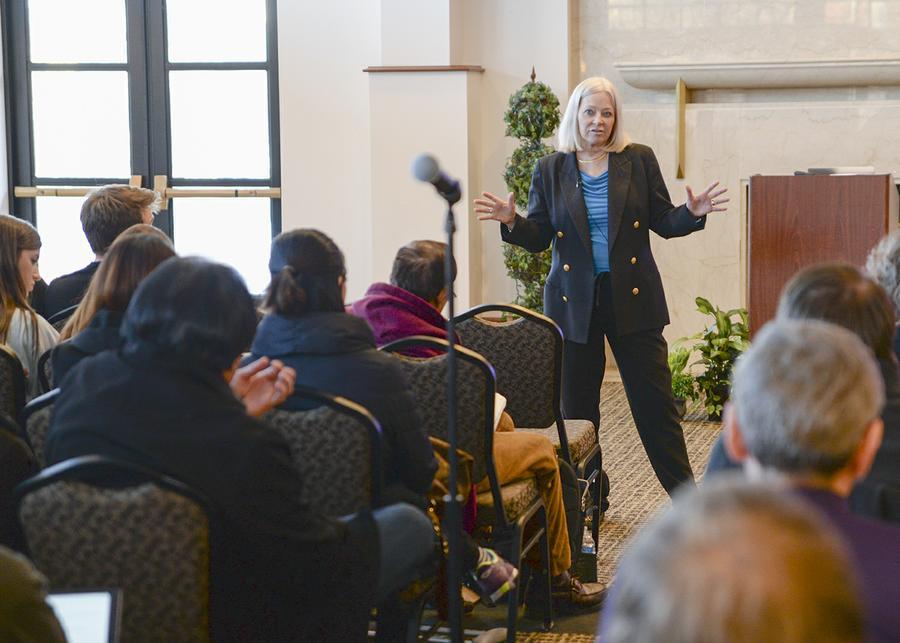Associate Dean Esther Thorson took the podium Monday to outline her vision for the Missouri School of Journalism as the third of four finalists for the position of dean.
Thorson, who also serves as the director of research for the Donald W. Reynolds Journalism Institute, shared her insight on the current status of the Missouri School of Journalism and view what the future holds for the field with the students, faculty and alumni who attended the open forum.
After being introduced by search committee chairman and law professor Gary Meyers, Thorson started by commending the achievements the school has made thus far, stressing pride in established professional outlets that embody the “Missouri Method” and contribute to innovations in research and training through collaborative work across the campus. Thorson also presented her understanding of the challenges the school now faces, along with solutions to combat these difficulties that she would put in place as dean.
Thorson praised that the combination of practice and research is “nowhere better realized than in MU’s journalism school,” yet she said she thinks there’s still room for improvement in terms of articulating what the Missouri Method yields.
“Guaranteeing that our experience in research and practice is shared within the industry, the press and the citizens is the responsibility of the dean,” she said.
Thorson discussed her thoughts on ensuring continued growth toward Association of American Universities’ criteria. After losing top scholars in recent years, she said she is on a quest to regain strength through partnering with leading industry practitioners and scholars, along with integrating doctoral programs with the communication branch in the College of Arts and Science to pump up funding and increase research productivity.
Thorson said she is eager to tackle the issue of rising education costs and student debt.
“Our J-school can and should play a leadership role in meeting with these challenges in higher education,” she said. “To free ourselves from the dependence on the state, we need to turn to development, partnerships and independent external funding for researchers and projects.”
Using the school’s 14-year-old online master’s program as an example, Thorson said she hopes to further promote the potential of an online education. Between the a rich curriculum offering and the faculty’s full support and combined with digital-based hybrid education offered through the journalism school, Thorson recognized its prospective progress.
“Online courses offer the opportunity to bring the Missouri Method to a global audience,” she said.
A strategic plan calling for collaborative effort is the first building block in her plan.
“If a strategic plan is not actively involved in decision-making, important goals get ignored.” Thorson said.
She said she recognizes that diversity is posing a huge challenge not only for the journalism school, but also for the industry. She later admitted that the lack of minorities in the newsroom, like at the Columbia Missourian, remains an issue to be addressed.
“Only by focusing on well-defined objectives to nurture diversity can we achieve success,” she said.
Thorson shared her observation on the rising rivalry in the industry, which is rendering the education environment between prestigious institutions across the country more competitive than ever. Facing challengers such as the University of Southern California, New York University, Northwestern University and Columbia University, important steps must be put in place to maintain the school’s national recognition and excellence to “know where we stand” and use better metrics to determine “whether we are progressing to where we want to be,” she said.
Thorson then went on to focus on the school’s visibility in public discussions, stressing the fading presence and influence of the journalism school on the national and international stage.
“Yes, we have this wonderful tradition, this wonderful reputation, the Missouri Medal, the ‘Missouri Method,’ first school of journalism, but when you read the coverage … where did we go?” Thorson said. “People forget if you don’t remind them. This rich, discovery-oriented environment is not being effectively communicated to the world, including our history.”
Thorson said she believes it’s the responsibility of the dean to correct the course and to spread the school’s influence and promote active engagement through better communication.
“The dean needs to be the articulator of our learning and responsible for the effectiveness of how influentially it is shared,” Thorson said.
In her final remarks, she stressed the importance of journalism to a healthy democracy and how the journalism school should evolve with the ever-changing era.
“It’s time to leave pessimism behind,” Thorson said. “And (to) become the voice and hope for action, growth and success in quality journalism and strategic communication.”
Associate Dean Lynda Kraxberger, a member of the search committee, said the candidate’s insight on the internal relations between research and community is an advantage.
“(Thorson) has great understanding and knowledge of research and the way research ties to the larger lifeblood of the university and to our community,” Kraxberger said. “I think that makes her a strong candidate.”
Frank Russell, a doctoral student representing graduate students on the search committee, said he has a lot of loyalty to Thorson in part due to her efforts and accomplishments for the doctoral program.
“I thought she did an excellent job, especially (in) presenting a vision for the school and how she would achieve that vision,” he said.
Provost Garnett Stokes will review all four candidates — Thorson, [David Kurpius](https://www.themaneater.com/stories/2015/2/18/journalism-dean-candidate-kurpius-wants-focus-stud/), [Sonya Forte Duhé](https://www.themaneater.com/stories/2015/2/13/journalism-dean-candidate-duhe-discusses-changing-/), who have both already visited campus for an open forum, and Thor Wasbotten — for the position of dean and consult the search committee before making a hire.
Wasbotten will visit campus Thursday and present at an open forum beginning at 4 p.m. in Leadership Auditorium in the upper level of the MU Student Center.














